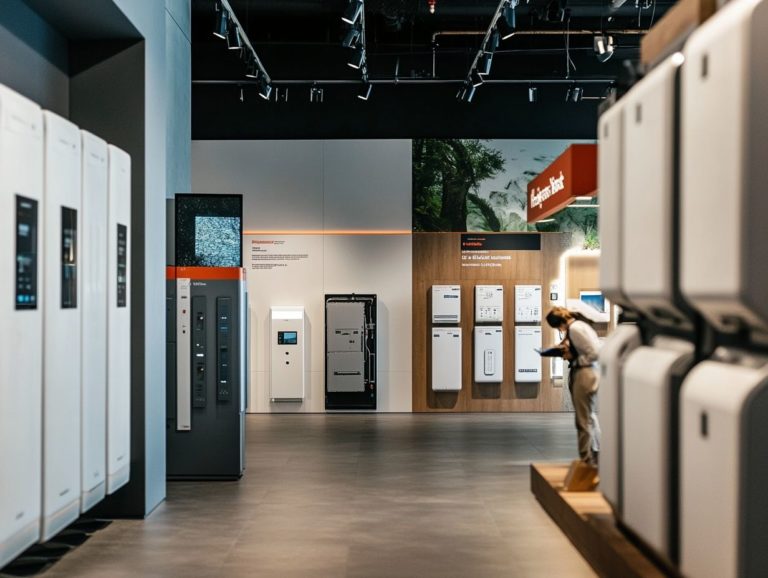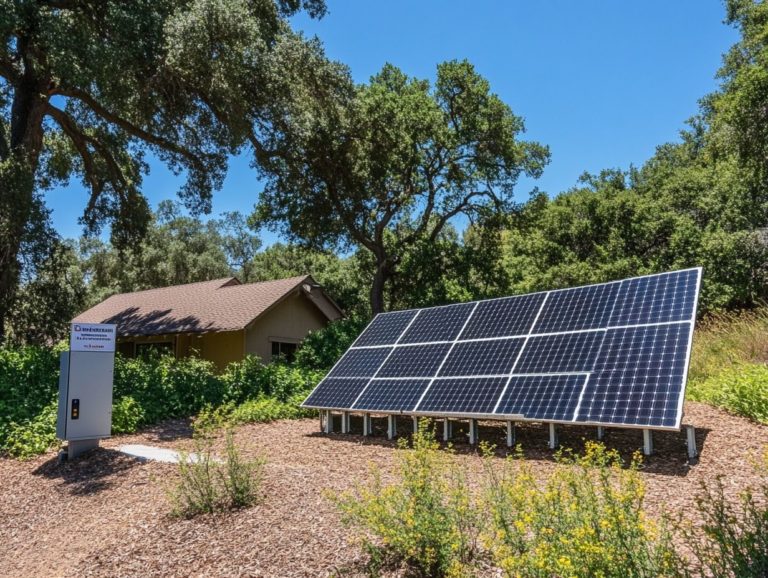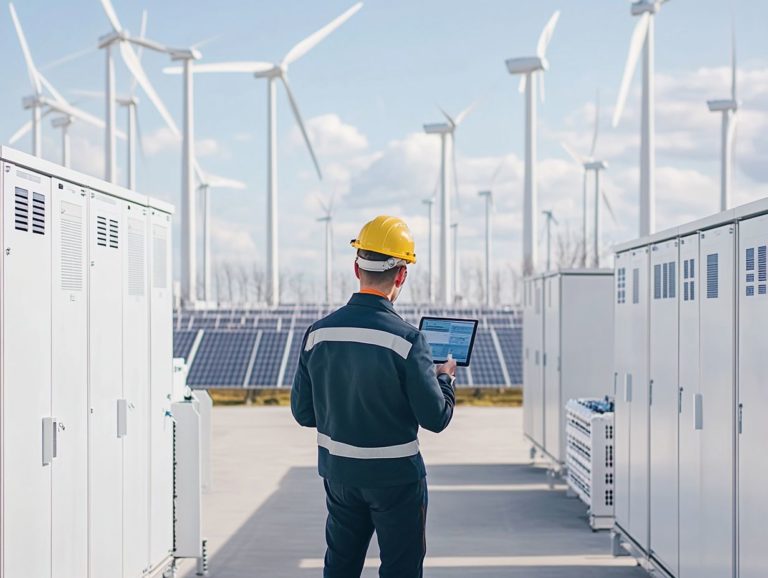5 Must-Have Features in Energy Storage Systems
In today s rapidly evolving energy landscape, energy storage systems have become essential for enhancing both energy efficiency and sustainability.
This article delves into five must-have features that define high-performing battery systems: scalability, high efficiency, long lifespan, advanced monitoring and control, and safety and reliability. You ll explore the various battery types, their impact on performance, and the compelling benefits of investing in these systems.
The article also addresses the challenges these systems face and their vital role in shaping a sustainable future. Get ready to explore how these features can revolutionize your energy management!
Contents
- Key Takeaways:
- 1. Scalability
- 2. High Efficiency
- 3. Long Lifespan
- 4. Advanced Monitoring and Control
- 5. Safety and Reliability
- What Are Energy Storage Systems and Why Are They Important?
- What Are the Different Types of Energy Storage Systems?
- How Do These Features Affect the Performance of Energy Storage Systems?
- What Are the Benefits of Investing in Energy Storage Systems with These Features?
- What Are the Common Challenges Faced by Energy Storage Systems with These Features?
- How Can Energy Storage Systems with These Features Contribute to a Sustainable Future?
- Frequently Asked Questions
- What are the top 5 must-have features in energy storage systems?
- Why is high capacity important in energy storage systems?
- How does quick charging benefit energy storage systems?
- What role does efficiency play in energy storage systems?
- Why is durability an important consideration in energy storage systems?
- How does safety factor into energy storage systems?
Key Takeaways:
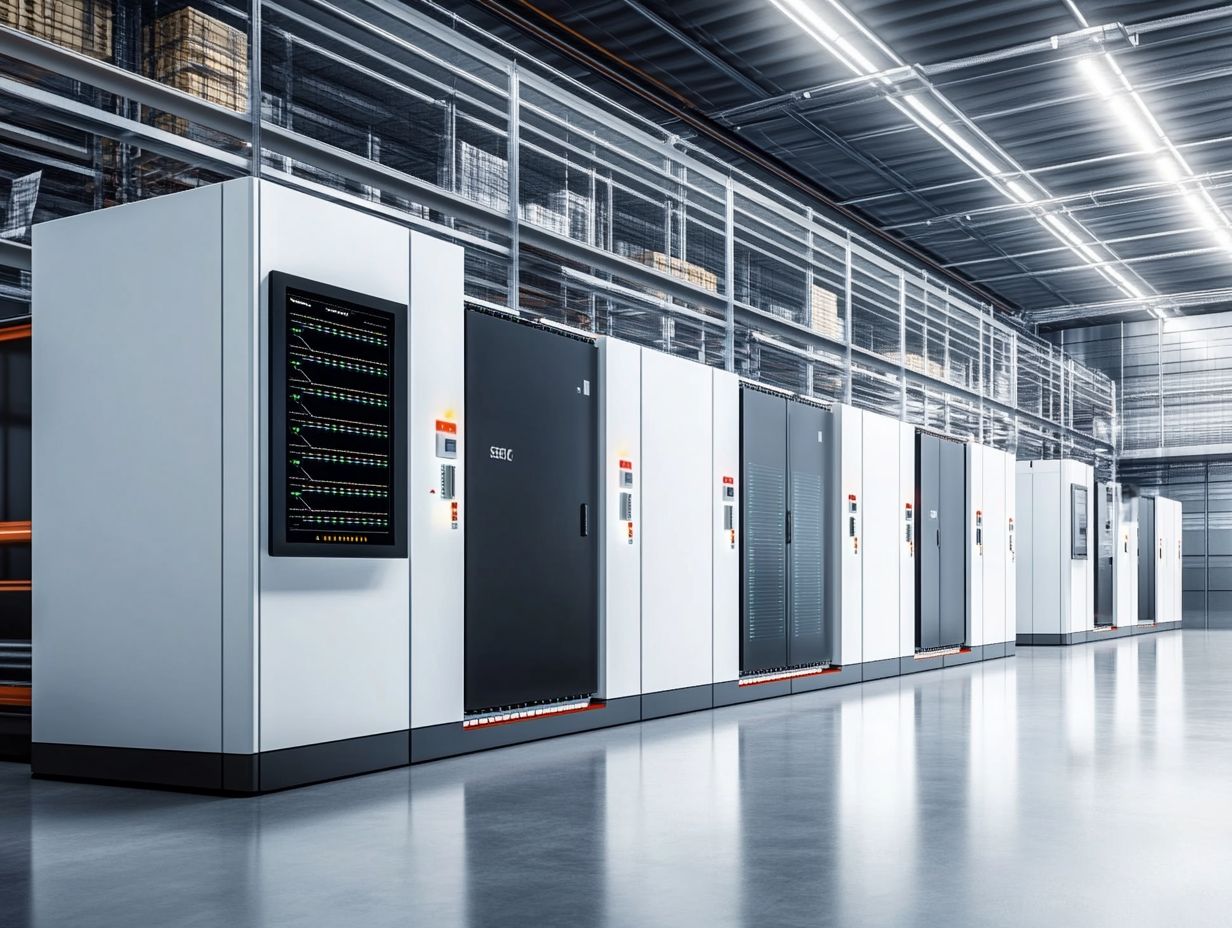
1. Scalability
Scalability in energy storage is crucial for accommodating the rising demands of renewable energy integration. This adaptability allows your battery systems to adjust to the evolving landscape of electrical demand while supporting global net-zero initiatives.
This adaptability not only allows for the deployment of various battery technologies like lithium-ion, flow batteries, and pumped hydro storage but also enhances the overall efficiency and reliability of your energy management systems.
By embracing a diverse array of energy storage solutions, scalability plays a vital role in optimizing energy dispatch and minimizing waste. As your energy consumption continues to climb, having systems that can grow and adjust is essential.
This approach ensures that you can effectively harness renewable energy sources, ultimately making a significant contribution to sustainability goals and helping secure a greener future.
2. High Efficiency
High efficiency in energy storage systems is essential for maximizing power output and minimizing losses. This enables technologies like battery energy storage to function effectively across various conditions, all while avoiding safety issues where batteries can overheat.
Different battery types, such as lithium-ion and sodium-sulfur, present distinct metrics of energy efficiency, each contributing uniquely to performance thresholds in energy systems.
Lithium-ion batteries, with their high energy density and swift charging capabilities, shine in applications ranging from electric vehicles to renewable energy integration. Conversely, sodium-sulfur batteries, while less common, offer notable advantages in large-scale storage solutions due to their impressive lifespan and thermal stability.
By understanding and optimizing these efficiency metrics, you can create tailored solutions that not only meet demand but also bolster reliability, paving the way for advancements in sustainable energy.
3. Long Lifespan
The longevity of energy storage systems significantly impacts their overall cost-effectiveness, allowing you to reduce maintenance costs while boosting energy resilience across various applications.
New developments in battery parts and tech are essential for achieving this durability. For example, advancements in lithium-ion chemistry and materials have resulted in batteries that endure more charge cycles without degrading.
Flow batteries are another impressive option, thanks to their scalable design that facilitates extended service life through simple maintenance. Supercapacitors are also advancing, enabling rapid charge and discharge cycles while maintaining performance over time.
Incorporating battery tracking technology is crucial; it allows you to monitor the health and usage of each unit, ensuring optimal performance and timely maintenance. This comprehensive approach ultimately enhances the sustainability and efficiency of your energy storage solutions.
4. Advanced Monitoring and Control
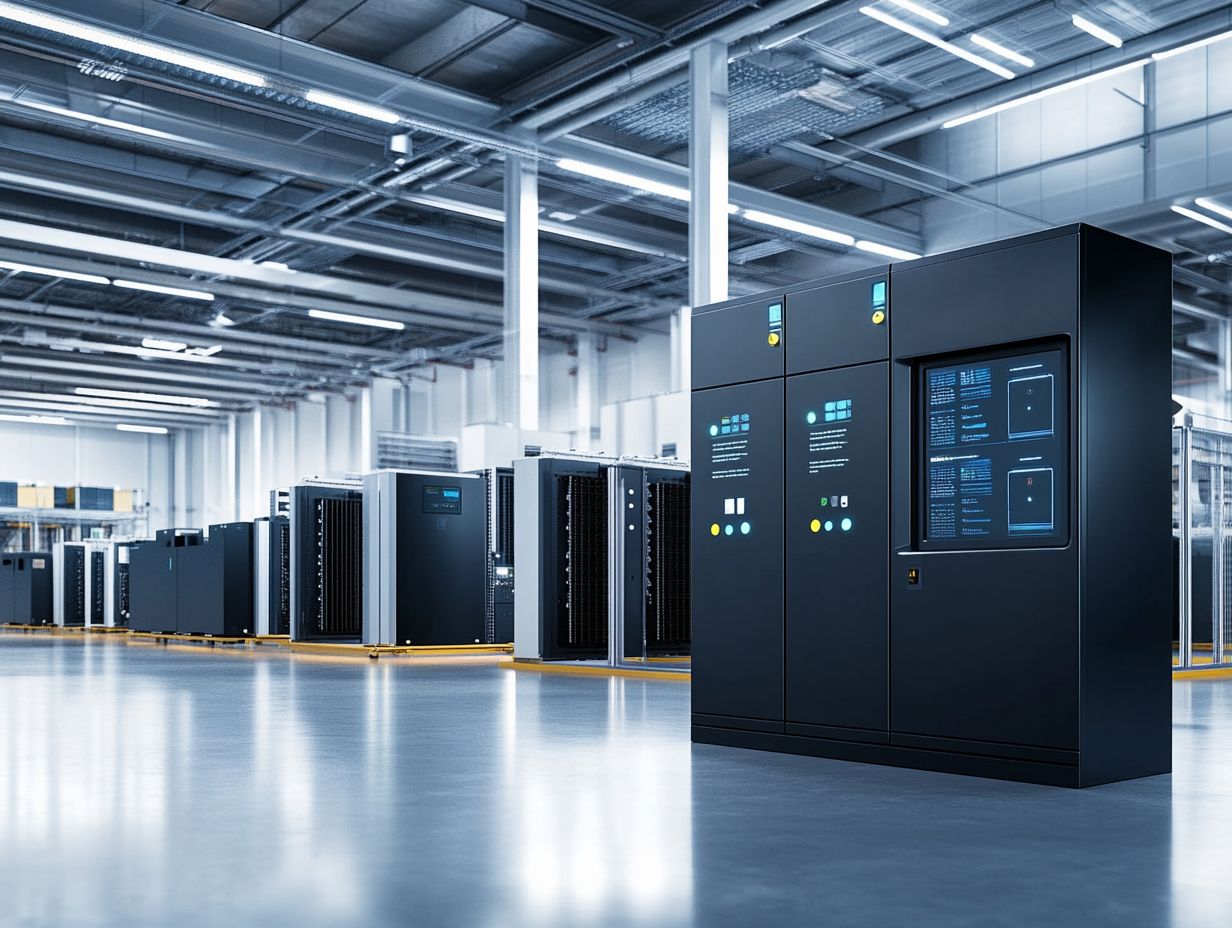
Advanced monitoring and control technologies are essential for optimizing energy storage systems. They provide real-time data and analytics that significantly enhance energy management, adapting seamlessly to ever-fluctuating electrical demand and consumption patterns.
These technologies include a variety of sophisticated solutions, such as IoT sensors, software platforms, and predictive analytics tools. All are designed to help you evaluate system performance and make informed decisions. By integrating effortlessly with your energy storage systems, they enable you to track energy flow, usage patterns, and identify potential inefficiencies more effectively.
Remote monitoring is vital for ensuring system reliability, drastically reducing response times for troubleshooting and maintenance.
With a holistic approach to oversight, you can proactively manage your energy resources, ensuring they meet both current and future energy demands with remarkable efficiency.
5. Safety and Reliability
Safety and reliability stand at the forefront of energy storage system design and operation. These elements influence everything from preventing overheating in batteries to ensuring robust backup power capabilities. Comprehensive safety training for all personnel is essential.
It’s vital to grasp the protocols and standards in place that help minimize risks while ensuring compliance with industry regulations. Don t forget to consider the environmental impacts of your storage technologies. Regular training sessions prepare you for emergencies and enhance your understanding of sustainable practices, aiding in the reduction of ecological harm.
The reliability of these systems is more than just a protective measure for assets; it s pivotal in delivering effective energy solutions across various sectors. Whether for residential setups or large-scale grid projects, maintaining operational continuity is crucial for both safety and productivity.
What Are Energy Storage Systems and Why Are They Important?
Energy storage systems, especially battery energy storage systems, are essential to your energy transition journey. They facilitate the integration of renewable energy sources, enhance energy efficiency, and provide backup power, ensuring a stable electrical grid.
Imagine these systems as powerful bridges that store excess energy generated during peak production times like the midday sun or breezy nights and utilize it when demand spikes or generation dips. By doing this, they mitigate the intermittency of renewable sources, ensuring a consistent power supply.
Their importance goes beyond mere energy reliability; they promote a flexible energy infrastructure that empowers you and your community to manage consumption more effectively while reducing reliance on fossil fuels.
Act now to enjoy dramatically lower energy costs and contribute to overall grid resilience. These systems serve as a cornerstone for sustainable development and pave the way for a cleaner energy future.
What Are the Different Types of Energy Storage Systems?
You ll find a variety of energy storage systems at your disposal, including lithium-ion batteries, sodium-sulfur batteries, pumped hydro storage, flow batteries, and supercapacitors.
Each of these systems brings unique benefits and applications tailored to their specific characteristics.
Every system operates on distinct principles. They align with specific energy demands and environments.
Lithium-ion batteries are celebrated for their ability to store a lot of energy in a small space, making them the go-to choice for portable electronics and electric vehicles.
Sodium-sulfur batteries excel in large-scale storage applications, thanks to their impressive capacity and cost-effectiveness.
Pumped hydro storage, which harnesses gravitational potential energy, remains a trusted solution for grid stability. It efficiently utilizes existing water resources.
Flow batteries offer remarkable versatility in scale and duration, making them particularly well-suited for integrating renewables.
Meanwhile, supercapacitors excel at delivering rapid energy discharge, perfect for applications that require quick bursts of power.
By carefully evaluating factors like energy density, capacity, and efficiency, you can identify the most suitable energy storage option for your specific needs, including following the best practices for solar energy integration.
How Do These Features Affect the Performance of Energy Storage Systems?
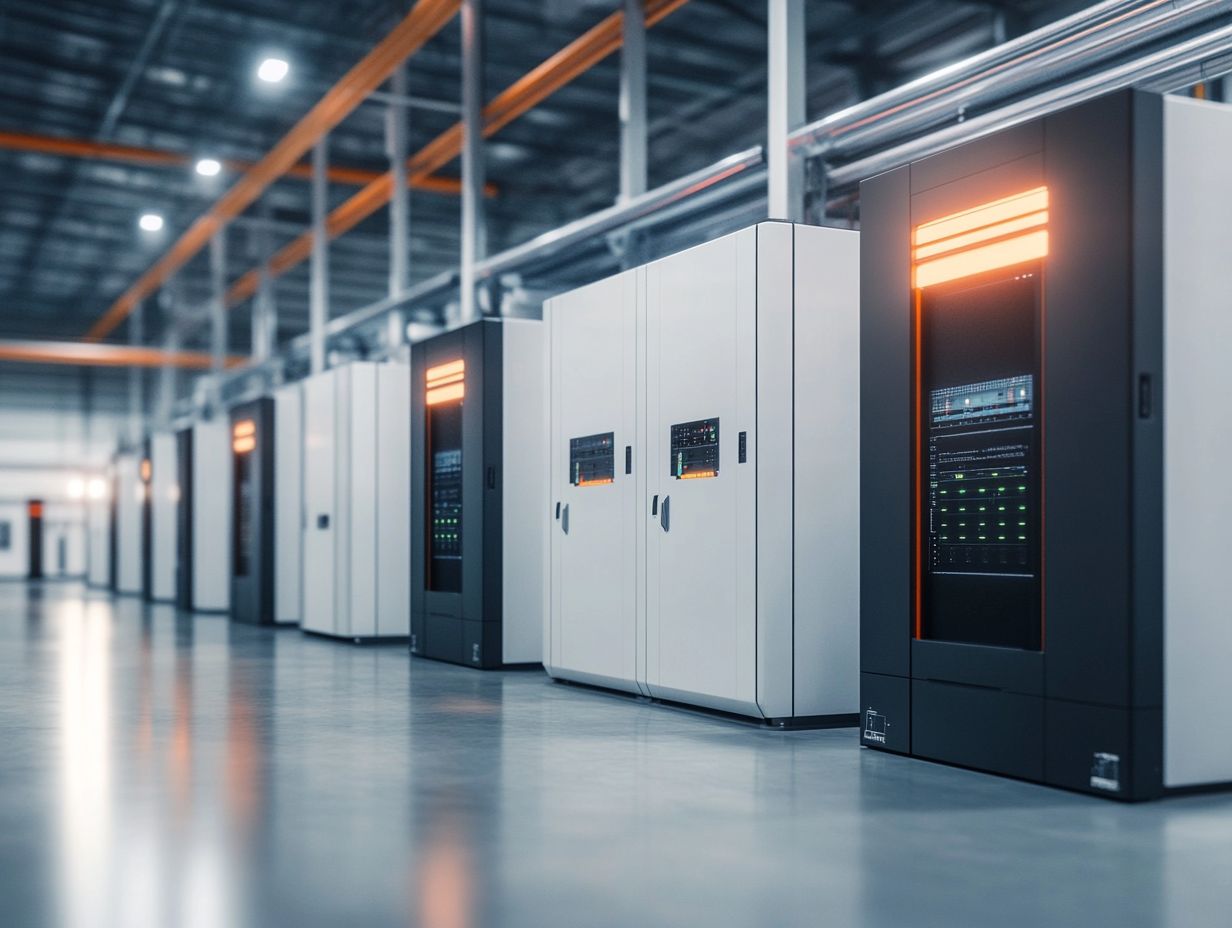
The features of energy storage systems, such as energy density and battery capacity, exert a significant influence on their performance thresholds.
They shape efficiency, voltage checks, and overall energy management capabilities.
A higher energy density enables you to store more energy within a compact footprint, optimizing the use of your limited space at home.
In utility-scale environments, ensuring optimal battery capacity is essential for meeting peak load demands. This allows you to effectively retain excess energy generated during high production periods for later use.
Advancements in battery technology, especially in rapid charging and discharging capabilities, play a crucial role in stabilizing grid fluctuations.
These characteristics elevate the operational effectiveness of various battery types and bolster comprehensive energy management strategies tailored specifically to your needs.
What Are the Benefits of Investing in Energy Storage Systems with These Features?
When you invest in energy storage systems with advanced features, you unlock incredible benefits!
These systems empower both businesses and households to harness renewable energy sources more effectively.
You ll be able to store excess energy generated during peak production times think sunny days for solar panels or breezy days for wind turbines.
For example, imagine a retail store that leverages energy storage to cut utility costs by utilizing stored energy during those high-demand periods when electricity prices skyrocket.
With enhanced energy resilience, you can minimize disruptions during outages, ensuring that critical operations continue without a hitch.
By optimizing your energy efficiency, you not only reduce waste but also contribute to a smaller carbon footprint, paving the way for a sustainable future for everyone.
The time to invest is now!
What Are the Common Challenges Faced by Energy Storage Systems with These Features?
Energy storage systems have advantages, but they also present challenges. These include the risks of thermal runaway, a condition where a battery overheats uncontrollably and can lead to serious failures, high maintenance costs, and the need for ongoing safety training to ensure safe operation and compliance with standards.
These challenges create operational hurdles and raise concerns about the long-term sustainability and efficiency of the systems. For instance, thermal runaway can result in catastrophic failures, especially in lithium-ion batteries, potentially causing extensive damage and increasing downtime. Maintaining these systems often requires specialized knowledge and resources, which can significantly raise your operational costs.
Innovations are emerging to address these challenges. Advanced cooling systems, AI-powered predictive maintenance, and more efficient battery chemistries are being explored. These innovations aim to enhance performance while ensuring the safe use of energy storage technologies.
How Can Energy Storage Systems with These Features Contribute to a Sustainable Future?
Advanced energy storage systems are game changers for a sustainable future. They facilitate the energy transition by optimizing your use of renewable energy, enabling energy arbitrage, and supporting the development of green hydrogen technologies.
Think of these innovative systems as your energy buffer. They absorb excess energy during peak production times from sources like solar and wind, allowing you to use that energy during high-demand periods. By smoothing out the fluctuations inherent in renewable generation, they enhance grid stability and reliability while reducing your dependence on fossil fuels. For more insights, explore 5 smart energy solutions for modern homes.
Energy storage is crucial for minimizing waste, ensuring clean energy is utilized efficiently and economically. Join the movement! This approach cuts down greenhouse gas emissions and helps your community transition to a more sustainable, resilient energy landscape aligned with global decarbonization efforts.
Frequently Asked Questions
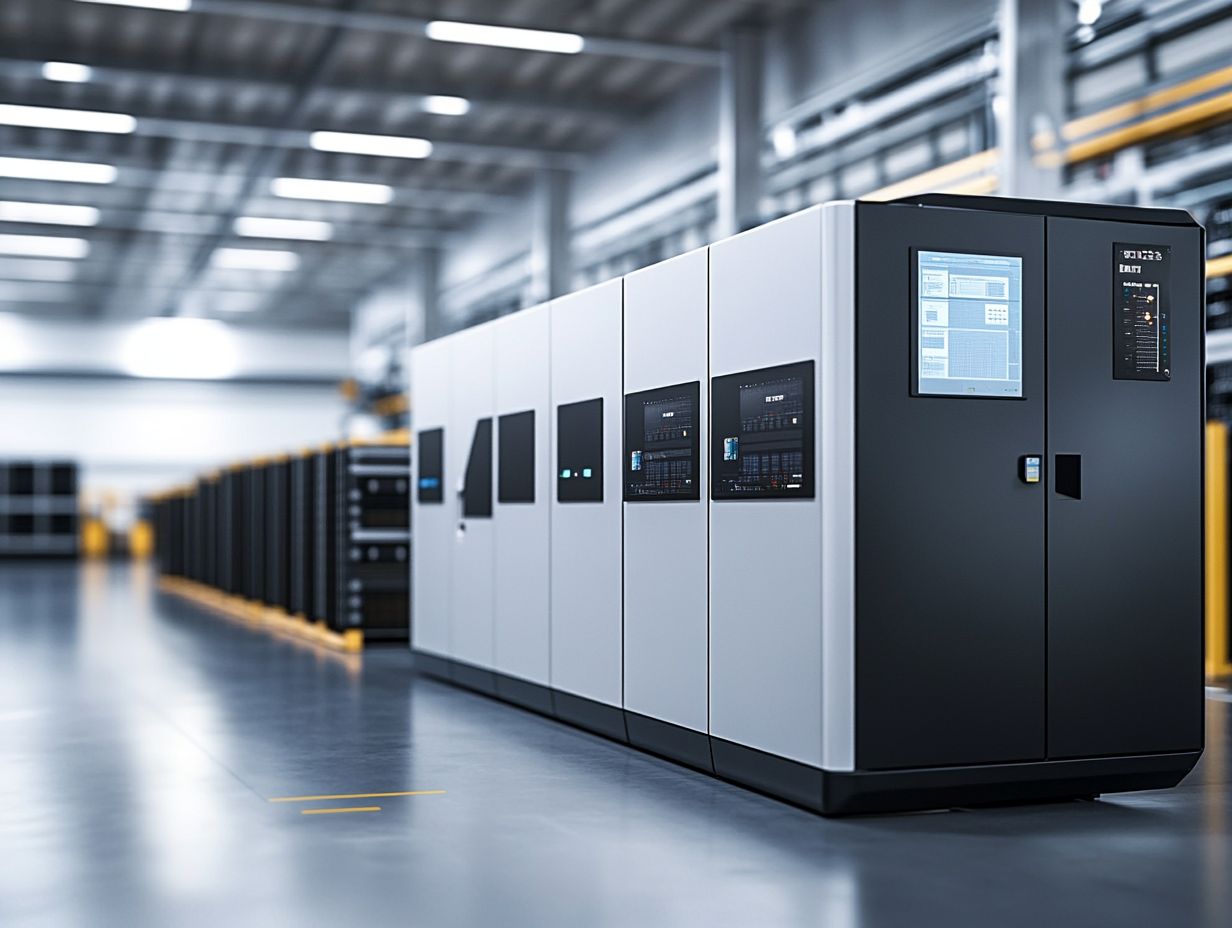
What are the top 5 must-have features in energy storage systems?
The top 5 must-have features in energy storage systems are high capacity, quick charging, efficiency, durability, and safety.
Why is high capacity important in energy storage systems?
High capacity is important because it allows for a larger amount of energy to be stored, providing longer backup power or more energy for daily use.
How does quick charging benefit energy storage systems?
Quick charging allows for a faster replenishment of energy, reducing downtime and increasing the system’s overall efficiency.
What role does efficiency play in energy storage systems?
Efficiency is crucial in energy storage systems because it determines how much of the stored energy can be used, minimizing loss and maximizing output.
Why is durability an important consideration in energy storage systems?
Durability ensures that the system can withstand wear and tear, weather conditions, and other potential hazards, ensuring long-term reliability and cost-effectiveness.
How does safety factor into energy storage systems?
Safety is critical in energy storage systems to prevent accidents and potential hazards, ensuring the protection of both the system and its users.

